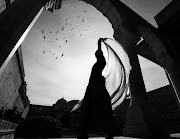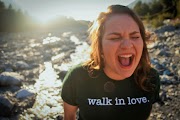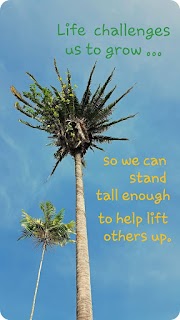 |
| This image shows a far better impression than is mostly true for the visually impaired and other differently-abled in TnT. Photo by Jhaye-Q Baptiste |
(This Brew column first published Saturday July 5, 2003)
“We are citizens of Trinidad and Tobago, and we are not talking preferable treatment, we just want equal treatment like everyone else,”
– George Daniel, Chairman of the T&T Chapter of Disabled People
WHEN A BLIND PERSON walks down a pavement in Trinidad, you’d swear a leper was approaching.
I’ve seen high school girls cleave dramatically to each other and unreasonably paste themselves against walls. I’ve seen adult men in office attire back-back, flounder, fall of pavements – avoiding Death himself it seems.
The worst, however, are the people who roll their eyes (quite missing how lucky they are to be able to do that), or steups, or both and practically mutter, “Why I should move for you? Why you don’t save other people the bother and lock yourself in a house or something.”
It’s time we got a little more PC with that word “disabled.” If we refer to such individuals as differently-abled, then let us go right on ahead and call them dif-abled from now on. Let us save that word “disabled” for crepitating politicians who are not doing nearly enough – wait, I rescind that – who are not doing anything for the dif-abled community.
It’s 21st century Trinidad, boasting about being a developed nation (hah!), and we’re trying to deny people rights based on their sexual preference. Okay, so you’re opposed to homosexuals on the grounds of your religious belief; well, what’s your beef with the dif-abled then?
Differently-abled adrift
To quote president of the T&T Chapter of Disabled People International, George Daniel: “There is no provision in the education system for differently-abled persons. We can’t go to school, because we have no transport, but she (Education Minister Hazel Manning) asking us for resumes. If we had an opportunity to go to school we would have had doctorates.”
Imagine, Frances Olliverre of Diamond Vale, confined to a wheelchair, describes herself as “one of the luckier ones,” for having “received primary and secondary school education.” But can anybody truly call herself lucky when she has to deal with the likes of our laissez faire government. I could have sworn I once heard, “Education for all.”
Daniel advanced;
“The disabled had no access to transportation, housing, health centres, employment, recreation.”
I think he was a trifle inaccurate. Actually, it is more that the dif-abled are not provided with access to transportation, housing, et al.
Pound of flesh
Yet, they pay 15 per cent VAT like the rest of us. And if one should get a job in a certain wage bracket, you can bet your bottom dollar she’ll be further taxed. This money will go, for one thing, toward providing free secondary education for the children of wealthy businessmen. Meanwhile, the dif-abled in the community simply have to “suck de well.”
Plus, their money may be said to go toward furnishing worthy roads and sidewalks, which seem to have gone awry. It is still easier to walk around or over potholes and pavement holes than to roll in a wheelchair.
I say again, it is not the dif-abled who are disabled; it’s the people in power, with power, wielding all the wrong power.
The dif-abled use every ability and resource they possess to help make better lives for themselves and each other. Can Governmnet say the same? Can any of us say the same?
Every time I pass on Wrightson Road I remind myself to drop off one of these days and sit, as a show of support, with the fellahs protesting outside National Flour Mills’ compound. Guess what? I haven’t done it yet. See, it always seems hard, always inconvenient.
This is Jaye-Q of the Amazon body: long, strong, well-shaped limbs made for scaling mountains and a will made for scaling sexism, racism, all how bigotry. And it’s too hard to get out of a taxi?
Yet, the dif-abled long to move in the world. God, I feel so ashamed.
Wait. I’m crying.
Wait.
Okay. So one day I wore red. Big Deal. What have I done to help my diferently-abled sisters and brothers in this so-called “national unity” society of ours? Not much, I tell you. I have done not much.
But if I am not to be disabled for real, I need to do something. That goes for all of you: you ministers, you big businessmen, you architects, lawyers, school principals, parents and the rest. Then we’ll be more ... together.
Come good
Learn more about how I see my nation, from a real visual perspective. Hit the links:








0 Comments